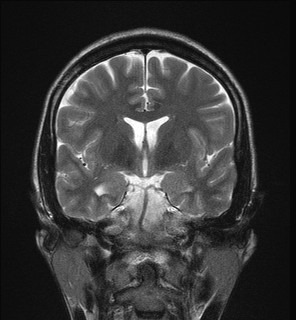Ho sabíeu?
Podeu fer doble clic en una paraula per a buscar-la a TermGallery.
Podeu fer doble clic en una paraula per a buscar-la a TermGallery.
Significats de hippocampal sclerosis en anglès

Neuropathological condition with severe neuronal cell loss and gliosis in the hippocampus.
Termes relacionats
Ús de hippocampal sclerosis en anglès
1
Conclusions: Conventional MRI is a sensitive method to detect hippocampal sclerosis.
2
No structural abnormalities, including hippocampal sclerosis, were detected on MRI performed on three individuals.
3
This asymmetry was more pronounced in patients with hippocampal sclerosis than in those without.
4
In addition, hippocampal sclerosis was specific to participants with dementia and correlated with the presence of limbic TDP-43.
5
The rodent pilocarpine model of epilepsy exhibits hippocampal sclerosis and spontaneous seizures and thus resembles human temporal lobe epilepsy.
6
Structural MRI showed unilateral hippocampal sclerosis (HS) in 13 patients and was normal in the remaining nine patients.
7
Areas of accelerated cortical thinning were detected in patients with early onset of epilepsy and in patients with hippocampal sclerosis.
8
These different forms of SSSE induce epilepsy with SRS and brain pathology reminiscent of temporal lobe epilepsy with hippocampal sclerosis.
9
Inflammation plays a role in the pathogenesis of immune-mediated epilepsy, but also in epilepsy of other etiology such as hippocampal sclerosis.
10
Objective: To present the clinical characteristics and surgical outcome of 6 patients with intractable epilepsy and coexisting extratemporal porencephaly and hippocampal sclerosis.
11
Background and purpose: Automated volumetry of the hippocampus is considered useful to assist the diagnosis of hippocampal sclerosis in temporal lobe epilepsy.
12
The diagnosis of mTLE was confirmed by the presence of hippocampal sclerosis on magnetic resonance imaging (MRI) and video-EEG monitoring.
13
The changes identified in patients with hippocampal sclerosis likely interfere with K homeostasis and may contribute to the epileptogenicity of the sclerotic hippocampus.
14
No such deficit was observed in hippocampal sclerosis patients, which appeared to benefit from a compensatory mechanism that was inefficient in tumour patients.
15
The massive neurodegeneration in the hippocampus is known as hippocampal sclerosis, and is considered one of the hallmarks of this type of difficult-to-treat epilepsy.
16
Hippocampal sclerosis of aging (HS-Aging) is a high-morbidity brain disease in the elderly but risk factors are largely unknown.
Aquesta col·locació està formada per:
Hippocampal sclerosis per variant geogràfica

Estats Units d'Amèrica
Comú

